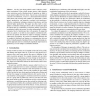Free Online Productivity Tools
i2Speak
i2Symbol
i2OCR
iTex2Img
iWeb2Print
iWeb2Shot
i2Type
iPdf2Split
iPdf2Merge
i2Bopomofo
i2Arabic
i2Style
i2Image
i2PDF
iLatex2Rtf
Sci2ools
ECAI
2004
Springer
2004
Springer
Adaptive Robot Coordination Using Interference Metrics
Abstract. One key issue facing robotic teams is effective coordination mechanisms. Many robotic groups operate within domains where restrictions such as limiting areas of operation are liable to cause spatial conflicts between robots. Our previous work proposed a measure of coordination, interference, that measured the total time robots dealt with resolving such conflicts. We found that a robotic group’s productivity was negatively correlated with interference: Effective coordination techniques minimized interference and thus achieved higher productivity. This paper uses this result to create adaptive coordination techniques that are able to dynamically adjust the efforts spent on coordination to match the number of perceived coordination conflicts in a group. Our robots independently calculate a projected level of interference they will encounter. By using this metric as a guide, we are able to create adaptive coordination methods that can quickly and effectively adjust to changi...
Artificial Intelligence | Coordination Techniques | ECAI 2004 | Effective Coordination | Effective Coordination Mechanisms |
Related Content
| Added | 01 Jul 2010 |
| Updated | 01 Jul 2010 |
| Type | Conference |
| Year | 2004 |
| Where | ECAI |
| Authors | Avi Rosenfeld, Gal A. Kaminka, Sarit Kraus |
Comments (0)

